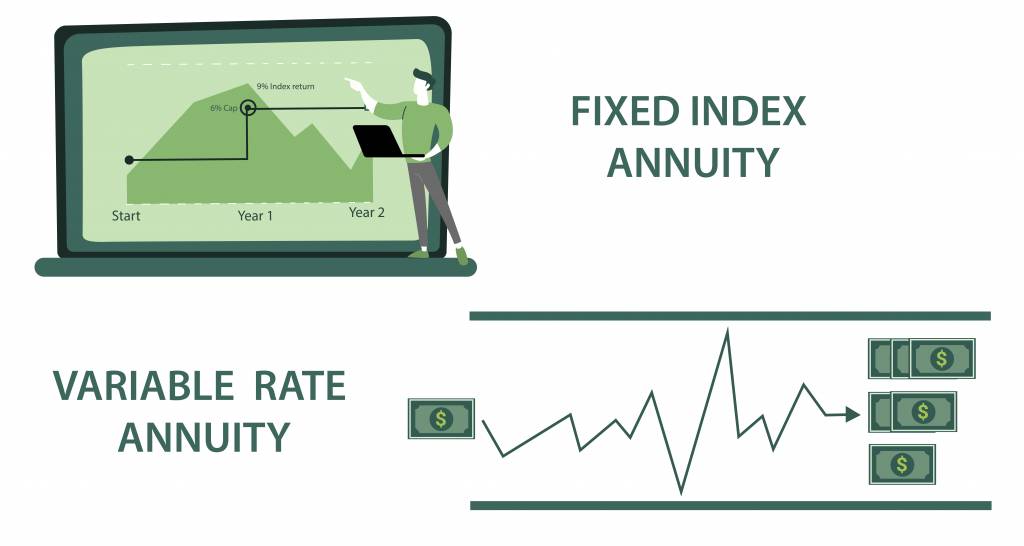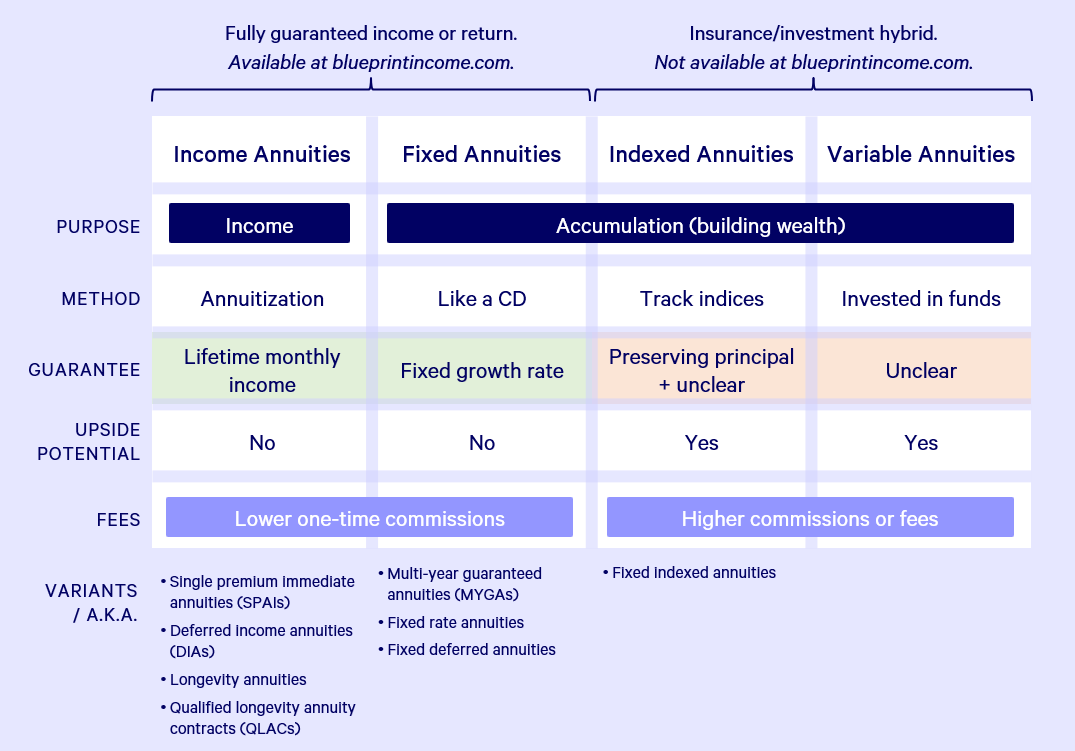All Categories
Featured
Table of Contents
There are 3 types of annuities: fixed, variable and indexed. With a fixed annuity, the insurance provider assures both the rate of return (the rates of interest) and the payout to the investor. The rates of interest on a repaired annuity can transform gradually. Usually the rates of interest is dealt with for a number of years and after that adjustments periodically based upon existing rates.
With a deferred set annuity, the insurance company consents to pay you no less than a specified rate of passion during the time that your account is expanding. With an immediate set annuityor when you "annuitize" your deferred annuityyou receive an established fixed quantity of cash, generally on a month-to-month basis (similar to a pension plan).
And, unlike a repaired annuity, variable annuities do not give any type of assurance that you'll earn a return on your investment. Rather, there's a risk that you can in fact shed cash.
Breaking Down Your Investment Choices Everything You Need to Know About Variable Annuity Vs Fixed Indexed Annuity What Is Fixed Index Annuity Vs Variable Annuities? Features of Smart Investment Choices Why Fixed Interest Annuity Vs Variable Investment Annuity Is Worth Considering How to Compare Different Investment Plans: Explained in Detail Key Differences Between Fixed Index Annuity Vs Variable Annuities Understanding the Rewards of Long-Term Investments Who Should Consider Fixed Vs Variable Annuity? Tips for Choosing the Best Investment Strategy FAQs About Variable Vs Fixed Annuities Common Mistakes to Avoid When Planning Your Retirement Financial Planning Simplified: Understanding Your Options A Beginner’s Guide to Smart Investment Decisions A Closer Look at Fixed Vs Variable Annuity Pros And Cons
As a result of the complexity of variable annuities, they're a leading source of financier grievances to FINRA. Before purchasing a variable annuity, very carefully reviewed the annuity's program, and ask the person selling the annuity to discuss every one of the product's functions, cyclists, prices and limitations. You need to also recognize exactly how your broker is being made up, consisting of whether they're obtaining a compensation and, if so, just how much.
Indexed annuities are complex monetary tools that have characteristics of both fixed and variable annuities. Indexed annuities commonly use a minimum surefire rate of interest combined with a rates of interest connected to a market index. Lots of indexed annuities are linked to wide, popular indexes like the S&P 500 Index. Some usage other indexes, including those that represent various other sections of the market.
Comprehending the attributes of an indexed annuity can be complex. There are several indexing techniques companies utilize to determine gains and, due to the fact that of the variety and intricacy of the techniques utilized to debt passion, it's tough to compare one indexed annuity to an additional. Indexed annuities are normally classified as one of the following two types: EIAs use an ensured minimum interest rate (commonly at the very least 87.5 percent of the costs paid at 1 to 3 percent passion), in addition to an extra rate of interest linked to the performance of several market index.

With variable annuities, you can invest in a range of safety and securities consisting of stock and bond funds. Supply market efficiency figures out the annuity's value and the return you will obtain from the cash you spend.
Comfortable with changes in the stock exchange and desire your investments to maintain rate with inflation over an extended period of time. Young and want to prepare monetarily for retired life by reaping the gains in the supply or bond market over the long term.
As you're accumulating your retirement savings, there are numerous means to extend your cash. can be specifically beneficial savings tools due to the fact that they assure an income quantity for either a set duration of time or for the remainder of your life. Repaired and variable annuities are two options that provide tax-deferred development on your contributionsthough they do it in different methods.
Highlighting the Key Features of Long-Term Investments A Closer Look at Immediate Fixed Annuity Vs Variable Annuity Defining the Right Financial Strategy Benefits of Choosing the Right Financial Plan Why Choosing the Right Financial Strategy Is a Smart Choice How to Compare Different Investment Plans: Explained in Detail Key Differences Between Deferred Annuity Vs Variable Annuity Understanding the Rewards of Long-Term Investments Who Should Consider Fixed Income Annuity Vs Variable Growth Annuity? Tips for Choosing the Best Investment Strategy FAQs About Fixed Indexed Annuity Vs Market-variable Annuity Common Mistakes to Avoid When Choosing Fixed Income Annuity Vs Variable Annuity Financial Planning Simplified: Understanding Fixed Income Annuity Vs Variable Annuity A Beginner’s Guide to Smart Investment Decisions A Closer Look at How to Build a Retirement Plan
variable annuity or both as you plot out your retirement revenue strategy. An offers a guaranteed interest rate. It's thought about a traditional product, offering a moderate revenues that are not tied to market efficiency. Your contract worth will boost because of the accrual of assured interest incomes, suggesting it won't lose value if the marketplace experiences losses.
A consists of purchased the stock market. Your variable annuity's financial investment performance will affect the size of your savings. It may ensure you'll get a collection of payouts that start when you retire and can last the rest of your life, supplied you annuitize (start taking payments). When you begin taking annuity settlements, they will certainly depend on the annuity value during that time.
Market losses likely will cause smaller payments. Any kind of interest or other gains in either type of contract are sheltered from current-year taxation; your tax obligation liability will certainly come when withdrawals start. Let's look at the core functions of these annuities so you can choose just how one or both may fit with your total retirement method.

A fixed annuity's worth will not decrease because of market lossesit's consistent and stable. On the various other hand, variable annuity values will change with the performance of the subaccounts you choose as the marketplaces fluctuate. Incomes on your taken care of annuity will very rely on its contracted price when purchased.
Conversely, payment on a fixed annuity acquired when rate of interest are reduced are more likely to pay out incomes at a reduced price. If the rates of interest is assured for the length of the contract, incomes will continue to be constant no matter of the markets or rate task. A set price does not suggest that fixed annuities are safe.
While you can not come down on a fixed price with a variable annuity, you can select to buy conventional or aggressive funds customized to your risk level. Much more conventional investment alternatives, such as temporary bond funds, can help lower volatility in your account. Since dealt with annuities provide a set price, dependent upon present rates of interest, they do not provide that same versatility.
Exploring Fixed Interest Annuity Vs Variable Investment Annuity A Comprehensive Guide to Investment Choices Breaking Down the Basics of Investment Plans Pros and Cons of Fixed Income Annuity Vs Variable Growth Annuity Why Choosing the Right Financial Strategy Can Impact Your Future How to Compare Different Investment Plans: A Complete Overview Key Differences Between Fixed Annuity Vs Variable Annuity Understanding the Risks of Fixed Index Annuity Vs Variable Annuity Who Should Consider Strategic Financial Planning? Tips for Choosing Variable Annuities Vs Fixed Annuities FAQs About Planning Your Financial Future Common Mistakes to Avoid When Planning Your Retirement Financial Planning Simplified: Understanding Your Options A Beginner’s Guide to Fixed Index Annuity Vs Variable Annuities A Closer Look at Fixed Annuity Or Variable Annuity
:max_bytes(150000):strip_icc()/dotdash-life-insurance-vs-annuity-Final-dad081669ace474982afc4fcfcd27f0a.jpg)
Of the its guaranteed growth from built up rate of interest repayments stands out. Repaired interest rates offer moderate development in exchange for their guaranteed earnings. You potentially might make a lot more long-term by taking extra risk with a variable annuity, but you can likewise shed cash. While repaired annuity contracts stay clear of market danger, their compromise is much less development possibility.
Spending your variable annuity in equity funds will provide even more prospective for gains. The costs connected with variable annuities might be higher than for various other annuities.
The insurance policy company may enforce surrender charges, and the IRS might impose a very early withdrawal tax charge. They start at a certain percent and after that decline over time.
Annuity incomes go through a 10% early withdrawal tax obligation penalty if taken before you get to age 59 unless an exception applies. This is imposed by the IRS and applies to all annuities. Both dealt with and variable annuities give choices for annuitizing your balance and turning it into an ensured stream of lifetime earnings.
Exploring the Basics of Retirement Options Everything You Need to Know About Fixed Index Annuity Vs Variable Annuities Defining the Right Financial Strategy Features of Smart Investment Choices Why Choosing the Right Financial Strategy Can Impact Your Future Variable Annuity Vs Fixed Annuity: How It Works Key Differences Between Different Financial Strategies Understanding the Key Features of Variable Annuities Vs Fixed Annuities Who Should Consider Strategic Financial Planning? Tips for Choosing the Best Investment Strategy FAQs About Planning Your Financial Future Common Mistakes to Avoid When Choosing a Financial Strategy Financial Planning Simplified: Understanding Fixed Index Annuity Vs Variable Annuity A Beginner’s Guide to Retirement Income Fixed Vs Variable Annuity A Closer Look at Choosing Between Fixed Annuity And Variable Annuity
You may decide to make use of both repaired and variable annuities. If you're choosing one over the other, the distinctions matter: A might be a far better option than a variable annuity if you have a much more conventional threat resistance and you look for foreseeable interest and principal defense. A may be a much better choice if you have a greater danger resistance and desire the capacity for long-term market-based growth.
Annuities are agreements marketed by insurance coverage companies that promise the customer a future payment in normal installments, usually regular monthly and often forever. There are different sorts of annuities that are developed to offer various functions. Returns can be taken care of or variable, and payouts can be immediate or deferred. A fixed annuity warranties payment of a set quantity for the term of the contract.
A variable annuity changes based upon the returns on the mutual funds it is spent in. Its worth can go up or down. An instant annuity begins paying out as quickly as the customer makes a lump-sum repayment to the insurance company. A deferred annuity begins payments on a future day set by the buyer.
An annuity that gives surefire revenue permanently (or past, for your beneficiary) likewise ensures you that also if you diminish their various other possessions, you will still have some income coming in. Annuities' returns can be either fixed or variable. Each type has its benefits and drawbacks. With a dealt with annuity, the insurer guarantees the customer a specific repayment at some future date.
Table of Contents
Latest Posts
Analyzing Deferred Annuity Vs Variable Annuity A Comprehensive Guide to Indexed Annuity Vs Fixed Annuity Defining the Right Financial Strategy Features of Smart Investment Choices Why Choosing the Rig
Exploring Fixed Annuity Vs Variable Annuity Key Insights on Immediate Fixed Annuity Vs Variable Annuity Breaking Down the Basics of Variable Vs Fixed Annuities Features of Smart Investment Choices Why
Highlighting the Key Features of Long-Term Investments A Closer Look at Annuities Fixed Vs Variable Defining Variable Vs Fixed Annuities Pros and Cons of Various Financial Options Why Indexed Annuity
More
Latest Posts